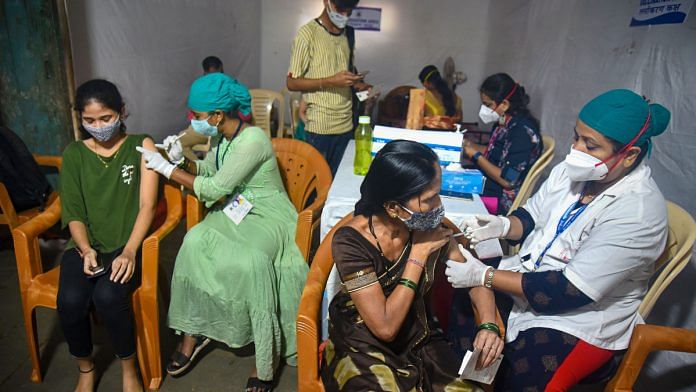New Delhi: With reports of at least a few thousand Covid infections in people who have received a single dose of the vaccine, the Modi government is looking at reducing the dose gap for Serum Institute’s Covishield. Currently, India is administering the second Covishield vaccine dose at an interval of 12-16 weeks.
“We are looking at real-world evidence from across the world to assess the effectiveness of the current regimen. We will take a call on the dose gap soon,” said a senior official of the Indian Council of Medical Research (ICMR) speaking on the condition of anonymity.
In May this year, India increased the Covishield dose gap claiming that real-world evidence has shown that a dose gap of 12-16 weeks increases efficacy. Earlier, the gap for Covishield doses was six-to-eight weeks. Interestingly, the day after India’s decision was announced, the UK decreased the gap for the Astrazeneca vaccine, citing a new variant on the prowl. None of the three studies that informed India’s decision to hike the gap actually looked at a 16-week gap though.
India’s reassessment of the vaccine regimen comes amidst reports from across the country, particularly Kerala, of a large number of post-vaccination infections, many of them after the first dose.
“We are still examining the reasons for breakthrough infections, though technically there is no surprise in vaccinated people getting the infection,” said a senior ICMR official.
“These are disease-modifying vaccines, not disease-preventing vaccines, so it is very important to continue the use of masks even after vaccination,” ICMR DG Dr Balram Bhargava said Thursday during the Covid briefing.
Also read: Forget Covid origin, the new question is when the first coronavirus case was
No decision yet on vaccination of children
Refuting multiple reports about the government having made the call to prioritise children with comorbidities for vaccinations as and when that process starts, health secretary Rajesh Bhushan said that it remains an open question.
“Whether all children should be taken up on priority or whether comorbid children should be priority, this is an issue on which the standing committee on Covid of NTAGI makes a recommendation to the full NTAGI. That recommendation has not been made yet. Once it is made NTAGI takes a call on it and makes a recommendation to the government. Then that process is concluded and a decision is taken,” Rajesh Bhushan replied to a question from ThePrint at the briefing.
NTAGI or the National Technical Advisory Group on Immunisation is the standing body that assesses available scientific evidence on all vaccines to advise the government.
Ahmedabad-based pharmaceutical company Zydus Cadila received emergency use authorisation for its Covid vaccine, ZyCoV-D, for children aged between 12-18 years, last week. However, Bhushan said that the government has been informed that the vaccine would be rolled out only in the first week of October, so negotiations with the company are still at a preliminary stage.
Also read: Second Covid wave not over yet, September and October crucial months, Centre cautions
‘Vaccination pace satisfactory’
Bhushan also said that in the past few weeks there have been no reports from any state of vaccine shortages, so the pace of vaccinations in the country can be termed as “satisfactory”.
So far in August, he said, an average of over 52 lakh doses have been administered every day. “In the last 24 hours we administered 80 lakh vaccines. Since there are a few more days to go this month, we can say that the numbers will become even better.”
He said currently over 51 per cent of the active cases are being concentrated in one state — Kerala. He also mentioned that all those coming in from Afghanistan are being tested for Covid, kept in quarantine or isolation wherever required, and also being given polio vaccines.
Sources in the ministry of health said so far “less than 20” people evacuated from the crisis-hit country have tested positive for SARS-CoV-2.
(Edited by Poulomi Banerjee)
Also read: 3rd wave could be worse than 2nd if vaccinations don’t pick up, bring 6L cases/day, govt warned



